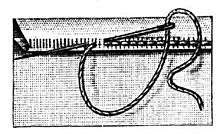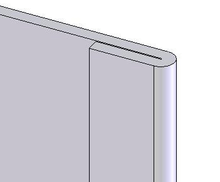Definify.com
Webster 1913 Edition
Hem
Hem
,Hem
,Hem
,Hem
,Hem
,Was
Webster 1828 Edition
Hem
HEM
, n.HEM
,HEM
,Definition 2026
hem
hem
English
Pronunciation
- IPA(key): /hɛm/
- (pin–pen merger) IPA(key): /hɪm/
- Rhymes: -ɛm
- Homophone: him (pin-pen merger)
Interjection
hem!
- Used to fill in the gap of a pause with a vocalized sound.
See also
Noun
hem (plural hems)
- An utterance or sound of the voice like "hem", often indicative of hesitation or doubt, sometimes used to call attention.
- Spectator
- his morning hems
- Spectator
Verb
hem (third-person singular simple present hems, present participle hemming, simple past and past participle hemmed)
- To make the sound expressed by the word hem; to hesitate in speaking.
- Shakespeare
- Hem, and stroke thy beard.
- Shakespeare
Derived terms
Translations
Etymology 2
From Middle English hem, hemm, in turn from Old English hemm and related to Middle High German hemmen (“to hem in”), Old Norse hemja (“to hem in, restrain”). The Proto-Indo-European root gave rise also to Armenian քամել (kʿamel, “to press, wring”) and Russian ком (kom, “lump”).
Noun


hem (plural hems)
- (sewing) The border of an article of clothing doubled back and stitched together to finish the edge and prevent it from fraying.
- A rim or margin of something.
- Shakespeare
- hem of the sea
- Shakespeare
- In sheet metal design, a rim or edge folded back on itself to create a smooth edge and to increase strength or rigidity.
Derived terms
Translations
|
|
Verb
hem (third-person singular simple present hems, present participle hemming, simple past and past participle hemmed)
- (intransitive) (in sewing) To make a hem.
- (transitive): To put hem on an article of clothing, to edge or put a border on something.
- (transitive): To surround something or someone in a confining way.
Translations
Related terms
Etymology 3
From Middle English hem, from Old English heom (“them”, dative), originally a dative plural form but in Middle English coming to serve as an accusative plural as well. More at 'em.
Pronoun
hem
- Obsolete form of 'em.
- Reginald Pecock (c.1450)
- Three trowings or opinions be causes and grounds of many and of well nigh all the errors which many of the lay party hold, and by which holding they unjustly and overmuch wite and blame the clergy and all heir (their) other neighbors of the lay side, which not hold tho same errors accordingly with hem, and therefore it is much need for to first give business to unroot and overturn tho three trowings, holdings, or opinions, before the improving of other; sithen if tho three be sufficiently improved, that is to say, if it be sufficiently proved that tho three be nought and untrue and bad, all the other untrue opinions and holdings built upon hem or upon any of hem must needs thereby take heir fall, and lack it whereby they might in any color or seeming be maintained, held, and supported.
- William Caxton (1481)
- And wente to the kinge and to the queene, and said to hem with a glad cheer.
- William Caxton (1485)
- For eyther of hem mayntened.
- Nisbet, M (1520-1535)
- He prayis hem to lyue releg[ious] lyff[is] and to luk waraly for the cummyng of the lord.
- Edmund Spenser (1579)
- Tho to the greene wood they speeden hem all.
- Ben Jonson (1598)
- Except we make hem such.
- John Marston (1605)
- They go forth on Holydays and gather hem by the seashore.
- Andrew Marvell (1661)
- The mayor and alderman or any six of hem.
- Reginald Pecock (c.1450)
Anagrams
Dutch
Etymology
From Middle Dutch hem, from Old Dutch himo, from Proto-Germanic *himmai.
Pronunciation
- IPA(key): /ɦɛm/
Pronoun
hem
- (personal) Third-person singular, masculine, objective: him.
- Stuur dat maar naar hem.
- Send that to him.
- Stuur dat maar naar hem.
Inflection
| subject | object | possessive | reflexive | genitive5 | |||||
|---|---|---|---|---|---|---|---|---|---|
| singular | full | unstr. | full | unstr. | full | unstr. | pred. | ||
| 1st person | ik | 'k1 | mij | me | mijn | m'n1 | mijne | me | mijner |
| 2nd person | jij | je | jou | je | jouw | je | jouwe | je | jouwer |
| 2nd person archaic or regiolectal | gij | ge | u | – | uw | – | uwe | u | uwer |
| 2nd person formal | u | – | u | – | uw | – | uwe | zich | uwer |
| 3rd person masculine | hij | ie1 | hem | 'm1 | zijn | z'n1 | zijne | zich | zijner |
| 3rd person feminine | zij | ze | haar | h'r1, 'r1, d'r1 | haar | h'r1, 'r1, d'r1 | hare | zich | harer |
| 3rd person neuter | het | 't1 | het | 't1 | zijn | z'n1 | zijne | zich | zijner |
| plural | |||||||||
| 1st person | wij | we | ons | – | ons, onze2 | – | onze | ons | onzer |
| 2nd person | jullie | je | jullie | je | jullie | je | – | je | – |
| 2nd person archaic or regiolectal6 | gij | ge | u | – | uw | – | uwe | u | uwer |
| 2nd person formal | u | – | u | – | uw | – | uwe | zich | uwer |
| 3rd person | zij | ze | hen3, hun4 | ze | hun | – | hunne | zich | hunner |
| 1) Not as common in written language. 2) Inflected as an adjective. 3) In prescriptivist use, used only as direct object (accusative). 4) In prescriptivist use, used only as indirect object (dative). |
5)Archaic. Nowadays used for formal, literary or poetic purposes, and in fixed expressions. 6) To differentiate from the singular gij, and in a similar vein to "you lot" or "you guys" in English, it is common to use gijlui ("you people") or gijlieden ("you people") or one of their contracted variants, and their corresponding objects, possessives and reflexives, in the plural. |
||||||||
Icelandic
Verb
hem (weak)
Latin
Interjection
hem!
Related terms
References
- hem in Charlton T. Lewis and Charles Short (1879) A Latin Dictionary, Oxford: Clarendon Press
- hem in Charlton T. Lewis (1891) An Elementary Latin Dictionary, New York: Harper & Brothers
Middle English
Pronoun
hem
- them
- 1407, The Testimony of William Thorpe, pages 40–41
- And I seide, “Ser, in his tyme maister Ioon Wiclef was holden of ful many men the grettis clerk that thei knewen lyuynge vpon erthe. And therwith he was named, as I gesse worthili, a passing reuli man and an innocent in al his lyuynge. And herfore grete men of kunnynge and other also drowen myche to him, and comownede ofte with him. And thei sauouriden so his loore that thei wroten it bisili and enforsiden hem to rulen hem theraftir… Maister Ion Aston taughte and wroot acordingli and ful bisili, where and whanne and to whom he myghte, and he vsid it himsilf, I gesse, right perfyghtli vnto his lyues eende. Also Filip of Repintoun whilis he was a chanoun of Leycetre, Nycol Herforde, dane Geffrey of Pikeringe, monke of Biland and a maistir dyuynyte, and Ioon Purueye, and manye other whiche weren holden rightwise men and prudent, taughten and wroten bisili this forseide lore of Wiclef, and conformeden hem therto. And with alle these men I was ofte homli and I comownede with hem long tyme and fele, and so bifore alle othir men I chees wilfulli to be enformed bi hem and of hem, and speciali of Wiclef himsilf, as of the moost vertuous and goodlich wise man that I herde of owhere either knew. And herfore of Wicleef speciali and of these men I toke the lore whiche I haue taughte and purpose to lyue aftir, if God wole, to my lyues ende.”
- 1407, The Testimony of William Thorpe, pages 40–41
Descendants
Pijin
Alternative forms
Etymology
Pronoun
hem
See also
Swedish
Etymology
From Old Norse heim < heimr, from Proto-Germanic *haimaz.
Pronunciation
Adverb
hem
- home; to one's home
- Det är dags att gå hem.
- It is time to go home.
- Det är dags att gå hem.
Noun
hem n
- a home; one's dwelling place, as in a house or a more general geographical place; the abiding place of the affections.
- a home; an institution
Declension
Related terms
|
|
|
|
|
|
References
- hem in Svenska Akademiens Ordlista över svenska språket (13th ed., online)